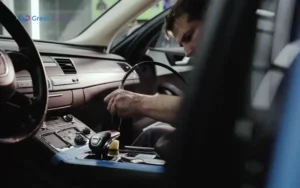Electric cars are very popular now. So, many want to convert gasoline cars into electric ones. But is it better to convert your car yourself or leave it to the professionals? This decision often boils down to cost, expertise, and how comfortable you are with a wrench. This article will explain what affects the cost of electric car conversion. It will cover both DIY and professional options.
Why consider converting to electric?
Interest in electric vehicles (EVs) is growing. But new electric cars can be costly. Many see converting their cars as a sustainable, cheaper option. It saves the cost of a new EV. It also helps the environment by extending the life of an existing vehicle.
DIY vs. Professional Conversion What’s the Difference?
There are two main routes for electric car conversions: DIY and professional. Both options have their own sets of costs, benefits, and challenges. The main difference is the cost and the required expertise.
Cost Breakdown: What’s Involved in an Electric Car Conversion?
The cost of electric car conversion can vary significantly based on several factors. Here’s a breakdown of the key components and costs involved:
-
Parts and Components: Motors, batteries, control systems, and other necessary hardware.
-
Labor: For professional conversions, labor can be a large part of the cost.
-
Time: Converting a car takes time, especially if you’re doing it yourself.
Parts and Components Needed for Conversion
For an electric car conversion, some essential parts and components are necessary, including:
-
Electric motor: Replaces the internal combustion engine.
-
Battery pack: Powers the motor and ultimately the vehicle.
-
Controller: Manages the power flow between the battery and the motor.
-
Charger: For recharging the battery.
-
Cooling systems: Keep the motor and batteries at optimal temperatures.
These components can vary in cost depending on the vehicle’s size and power needs.
Battery Options and Costs
The battery is often the most expensive part of the conversion. Its price depends on its size, type, and capacity. Batteries can cost from a few thousand to tens of thousands. Lithium-ion batteries cost more but perform better and last longer. Options include:
-
Lead-acid batteries: More affordable, but heavier and less efficient.
-
Lithium-ion batteries: They are light and efficient. They cost more upfront but have lower long-term maintenance costs.
Motor Types and Their Price Range
Different motor types come with varying costs and performance levels.
-
AC Motors: More expensive, but they offer better efficiency and smoother driving.
-
DC Motors: Generally cheaper and simpler, they are often preferred for DIY conversions.
Labor and Expertise: What to Expect from Each Option
Labor costs can vary based on the choice of a professional service. Skilled mechanics or EV specialists may charge $5,000 to $10,000. It depends on the project’s complexity and location.
DIY Conversion: The Pros and Cons
Converting a car yourself can be rewarding, but it comes with its challenges.
Pros:
-
Cost savings: You avoid paying for labor.
-
Learning opportunity: Ideal for those who enjoy hands-on projects.
-
Customization: Complete control over parts and components.
Cons:
-
Time-intensive: Expect a steep learning curve.
-
Requires technical knowledge: not suitable for everyone.
-
Limited warranty: DIY conversions don’t usually come with guarantees.
Professional Conversion: The Pros and Cons
Hiring a pro to convert your vehicle may be quicker and easier.
Pros:
-
Expertise: Skilled technicians ensure safety and quality.
-
Warranty and support: Many services offer warranties and post-conversion support.
-
Time-efficient: Professionals can complete the work in a fraction of the time.
Cons:
-
Higher cost: Professional conversions are often more expensive.
-
Less customization: Limited control over specific parts and choices.
Hidden Costs You Might Not Consider
There are also potential hidden costs in a conversion, such as:
-
Registration and inspection fees: additional fees for certifying your converted car as roadworthy.
-
Insurance adjustments: Some insurance companies may charge more for modified vehicles.
-
Maintenance for new parts: Certain components may need regular upkeep.
Comparing Time Investment: DIY vs. Professional
DIY conversions can take a few weeks to a few months. It depends on your experience and availability. Pros can often finish the project in weeks. This lets you hit the road faster.
Long-Term Benefits of Electric Conversion
Once the conversion is complete, the benefits begin to add up:
-
Lower fuel costs: Electricity is often cheaper than gasoline.
-
Reduced emissions: An eco-friendly choice that minimizes your carbon footprint.
-
Minimal maintenance: Electric cars need less upkeep than gas-powered vehicles.
Making the Choice: DIY or Professional?
It comes down to your budget, skills, and time. DIY or hire a pro? If you’re tech-savvy and on a budget, a DIY conversion might be a fun project. For a hassle-free experience, consider professional conversion services if you can pay more.
Conclusion
Converting a car to electric can be an exciting journey. You can do it yourself or hire a pro. The cost of electric car conversion is a big factor. By knowing the parts, labor, and hidden costs, you can make a better decision. No matter the route you choose, going electric is a bold step toward a cleaner, sustainable future.
Frequently Asked Questions
Q: How much does it cost to convert a car to electric?
The cost varies widely but generally ranges from $5,000 for DIY conversions to $20,000 or more for professional services.
Q: What are the main parts needed for an electric conversion?
Essential parts include a motor, battery pack, controller, charger, and cooling system.
Q: How long does an electric car conversion take?
DIY conversions can take several weeks to months, while professional conversions usually take a few weeks.
Q: Is a DIY conversion safe?
Yes, if done correctly. However, it requires significant technical knowledge and adherence to safety guidelines.
Q: Are there any tax incentives for electric car conversions?
Some regions offer tax credits or incentives for electric vehicles, including conversions. Check local regulations for eligibility.
By weighing your options and the cost of electric car conversion, you can make a better, budget-friendly choice that meets your goals.
If you enjoyed this, you might also like these:
- Travel Responsibly 10 Ways Sustainable Tourism Transforms Communities and Nature
- A Parent’s Guide to Understanding Smash Education







